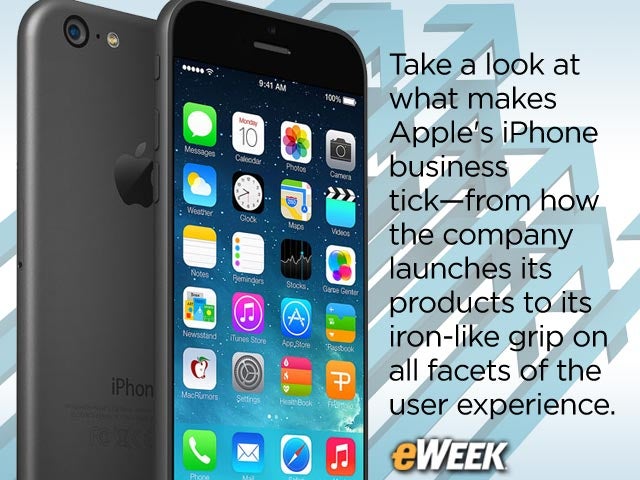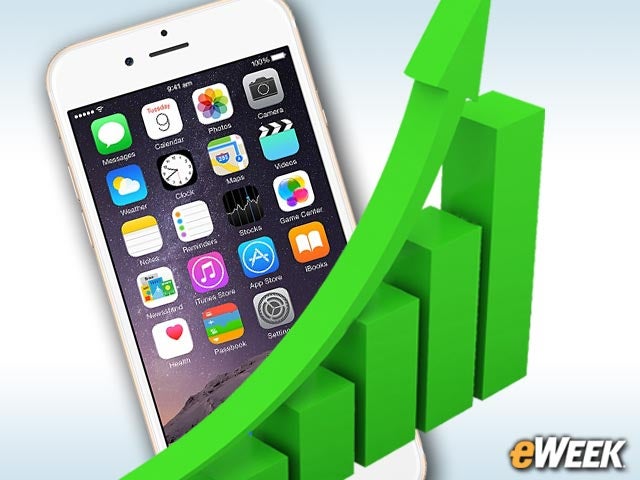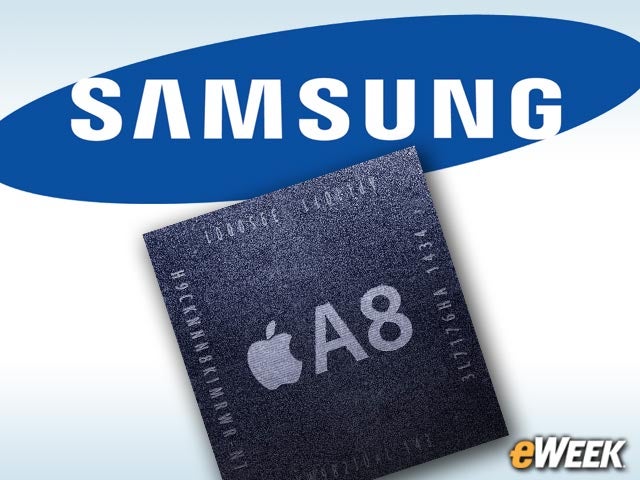eWEEK content and product recommendations are editorially independent. We may make money when you click on links to our partners. Learn More.
2iPhone Business Is Huge and Still Growing
Apple’s iPhone business is massive. During the company’s last-reported quarter, Apple revealed that it sold 61.2 million iPhones worldwide, up 40 percent from the same period last year. More importantly, Apple’s revenue in the iPhone division was up 55 percent, to $40.3 billion. The iPhone is a sales and profit juggernaut for Apple.
3Apple’s Annual Release Schedule Is Working Well
Apple follows a standard release schedule for its iPhone: The company offers a new version of its handset each year. As of late, the new iPhones have launched in the fall, and there’s a very good chance that the company will follow the same path this year with the launch of the iPhone 6S. Annual iPhone launches keep the product line fresh and boost Apple’s sales numbers, even as it continues selling earlier iPhone models to keep the revenue flowing.
4More to the Launch Schedule Than Meets the Eye
There’s much more to Apple’s launch schedule than one might think. Over the last several years, Apple has launched major upgrades to its hardware every other year. The interim years are saved for its “S” models, which come with nearly the same design as predecessors but offer some boosted specs. By using that launch schedule, Apple limits its costs every other year and boosts its margins on slightly updated models. It’s a smart move that pays off in major profits.
5Ironically, Rival Samsung Benefits Each Step of the Way
In an odd twist, one of Apple’s chief competitors in smartphones, Samsung, benefits greatly from the iPhone’s ongoing popularity. Samsung makes the processors built into Apple’s iPhone. So, with each sale of the company’s handset, Samsung is generating some revenue. Yes, believe it or not, despite their competition, Apple and Samsung are bedfellows when it comes to the iPhone.
6The Margins Are Staggering
The margins Apple is able to achieve on each iPhone sale are staggering. Each year, iPhone teardown specialists with knowledge of component costs teardown the handset to see what’s inside. They also estimate the component and assembly costs to determine how much Apple makes on the sale of each device. The teardown shows Apple makes hundreds of dollars in profit on each iPhone it sells.
7China Is a Major Contributor to Success
China is now Apple’s largest market, the company confirmed in an earnings call in April. Furthermore, China is one of the main reasons Apple’s iPhone has seen its sales growth soar in recent years. China has a massive consumer base and the market seems to be gravitating toward products from three companies: Xiaomi, Huawei and Apple. Unfortunately for Samsung, however, the China market seems to be moving away from that company’s devices.
8Samsung Is Becoming Less of a Factor
Samsung, once the biggest competitor to Apple, is now becoming less of a concern for the iPhone maker. In fact, recent data from research firms shows that sales on the Galaxy S6 were disappointing and Samsung’s market share is slipping both worldwide and in the key Chinese market. While Apple and Samsung are still competitors, it appears the iPhone maker is easily winning the war.
9It’s All About Control Over Apple’s Hardware and Software
Central to Apple’s strategy with the iPhone is control. Unlike the countless vendors that use Google’s Android platform and build their own hardware, Apple controls all facets of the user experience: The company builds the hardware and bundles its own operating system with the device. Apple is one of the few companies to have full control over the hardware and software, and that creates a generally attractive experience for consumers and enterprise users.
10Apple’s Services Keep Users Engaged
How does Apple keep its customers and entice them to keep buying new products? Part of the answer might be in its services. Apple has a wide range of services, including iTunes, iBooks and now Apple Music, that are all designed to keep people invested in its platforms. While it’s not hard for people to move off iTunes, the service works well enough to retain the loyalty of established users. So they keep buying Apple products and synchronize their content across the company’s devices. Apple’s services are a crucial component in the company’s iPhone success.
11Apple Doesn’t Care About Android’s Popularity
There is a paradox in the mobile market that Android has a big market-share lead in terms of the total number of devices sold. But Apple appears unconcerned about that. A quick look at Apple’s financial statements shows that the company is focused on selling hardware, not peddling software. Apple wants to be the top device-maker in the world with its iPhone and couldn’t care less if Android has a larger software footprint.










